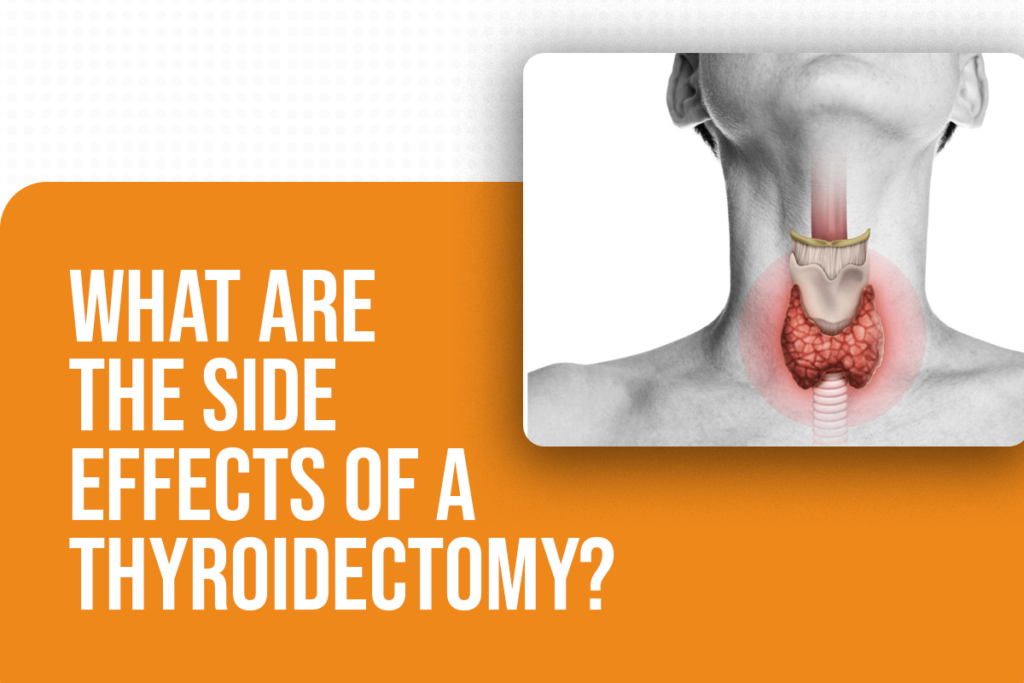Thyroidectomy, or thyroid removal surgery, is a common procedure recommended for patients with thyroid-related conditions like cancer, goiters, or overactive thyroid glands. While it is generally safe and effective, it’s natural to wonder about the side effects and what life looks like after surgery.
In this blog, we’ll walk you through what to expect before and after a thyroidectomy, why the surgery is performed, and how to recover smoothly. If you’re considering thyroid surgery, this article is your go-to guide.
What to Expect After a Thyroidectomy?
Like any surgery, thyroidectomy comes with a recovery period and some side effects. Most are temporary and manageable, but it’s important to know what to watch out for.
Common Side Effects Include:
- Hoarseness or voice changes
This happens due to temporary swelling or irritation near the vocal cords.
- Sore throat and neck pain
You may feel discomfort or stiffness for a few days post-surgery.
- Difficulty swallowing
Mild and usually improves within a week or two.
- Low calcium levels (Hypocalcemia)
If the parathyroid glands are affected, it can lead to tingling in the fingers or cramps.
- Fatigue
Your body needs rest to recover and adjust to hormone changes.
Less Common Side Effects:
- Infection or bleeding at the incision site
- Permanent voice changes (rare)
- Scarring
While a scar is inevitable, it usually fades over time and becomes less noticeable.
Why Choose Surgery?
Thyroidectomy is not recommended for every thyroid condition, but it becomes necessary in cases such as:
- Thyroid cancer – Removing the gland can help stop the spread.
- Large goiter – When it affects breathing, swallowing, or appearance.
- Hyperthyroidism – If medication or radioactive iodine doesn’t work.
- Suspicious thyroid nodules – Especially if there’s a risk of malignancy.
When these conditions affect your quality of life or pose health risks, surgery becomes a safe and effective solution.
The Procedure Explained
A thyroidectomy can be:
- Total thyroidectomy – The entire gland is removed.
- Partial thyroidectomy – Only a part of the thyroid is removed.
Surgery Duration:
Usually lasts 1 to 2 hours under general anesthesia.
Hospital Stay:
Most patients are discharged within 24 to 48 hours unless complications arise.
Recovery Time:
You can return to normal activities within 1-2 weeks. Full recovery may take a few more weeks, depending on your body and the extent of the surgery.
Benefits of Thyroidectomy
Despite the side effects, many patients experience significant improvements in their overall health after surgery.
Key Benefits:
- Elimination of thyroid cancer risk (in cancer cases)
- Improved breathing and swallowing if a large goiter was present
- Relief from hyperthyroidism symptoms such as anxiety, weight loss, and rapid heartbeat
- No need for ongoing nodule monitoring if they were suspicious or recurring
After a thyroidectomy, patients typically take thyroid hormone replacement (levothyroxine) to maintain healthy hormone levels. With proper dosage and monitoring, you can lead a perfectly normal life.
Tips for a Smooth Recovery
Recovery from thyroid surgery can be smooth if you follow some basic care steps.
Helpful Recovery Tips:
- Take prescribed medications (including thyroid hormone and calcium supplements)
- Avoid strenuous activities for at least two weeks
- Sleep with your head elevated to reduce swelling
- Use a soft scarf or high-collar shirt if you’re concerned about the neck scar
- Attend all follow-up appointments to monitor calcium levels and hormone balance
- Voice rest – If your voice feels hoarse, avoid speaking too much and consult your surgeon if it persists.
Thyroidectomy is a well-established and generally safe procedure with clear health benefits for those who need it. While side effects are possible, most are manageable and temporary. With the right care, support, and follow-up, you can enjoy a healthy life post-surgery.
If you’re dealing with thyroid problems and want expert advice, Dr. Sudarshen Aahire, an experienced ENT and head-neck surgeon in Nashik, is here to help. He specializes in thyroidectomy and related care, offering patient-first, expert-guided treatment.
Schedule your consultation today with Dr. Aahire and get personalized guidance on your thyroid journey.
Frequently Asked Questions (FAQs)
1. Will I need to take thyroid medication forever?
Yes, especially if your entire thyroid is removed. The medicine replaces the natural hormone your thyroid used to produce.
2. Can thyroidectomy affect my voice permanently?
In most cases, any hoarseness or voice change is temporary. Rarely, if a nerve is affected, it can lead to lasting changes, but this is uncommon with experienced surgeons.
3. How soon can I go back to work?
Most people return to work within 7 to 14 days, depending on how they feel.
4. Will the surgery leave a big scar?
The scar is usually small and fades over time. With proper care, it becomes less visible within a few months.
5. Can thyroidectomy affect calcium levels?
Yes. The parathyroid glands, located near the thyroid, control calcium levels. If they are disturbed during surgery, temporary low calcium levels may occur.
Dr. Sudarshen Aahire is a young, talented, and vibrant ENT and Pediatric doctor in Nashik with 12 years of experience. Apart from routine ENT care and surgeries he specializes in the management of Snoring and obstructive sleep apnea surgeries, Endoscopic skull base surgeries, voice-related disorders, and voice surgeries, airway and swallowing disorders.

